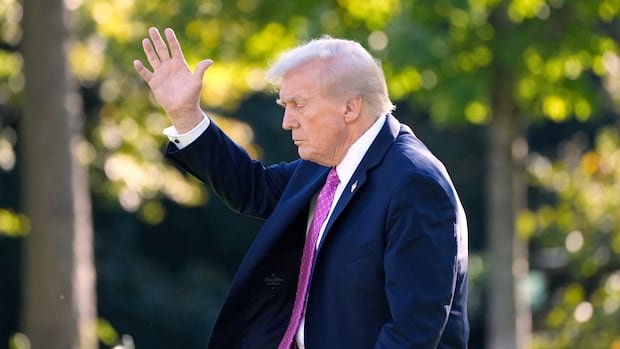The two survivors of an American military attack on a suspected drug-transporting ship in the Caribbean will be sent to their home countries of Ecuador and Colombia, US President Donald Trump said on Saturday.
The military rescued the pair after they attacked a diving vessel on Thursday, in at least the sixth such attack since early September.
“It was my great honor to destroy a very large drug submarine that was traveling a known drug trafficking transit route to the United States,” Trump said in a social media post. “US intelligence confirmed that this vessel was loaded primarily with fentanyl and other illegal drugs.”
After Trump’s announcement, the Pentagon released a short black-and-white video of the attack on X. In the clip, a ship can be seen moving through the waves with its front part just a few centimeters below the surface of the water. Several explosions are then seen, at least one over the stern of the ship.
The Republican president said two people on board were killed – one more than previously reported – and the two survivors would be sent to their home countries “for detention and prosecution.”
With Trump confirming the death toll on his Truth Social platform, this means that at least 29 people have been killed in US military actions against ships in the region.
The president justified the attacks by saying that the United States was in an “armed conflict” with drug cartels. He relies on the same legal authority that the George W. Bush administration used when it declared war on terrorism after the Sept. 11 attacks, and that includes the ability to capture and detain combatants and use lethal force to eliminate their leadership. Trump also treats the suspected human traffickers as if they were enemy soldiers in a traditional war.
The repatriation will spare the Trump administration questions about the pair’s legal status in the US justice system. It could also sidestep some of the legal problems that arose from the detention of enemy combatants in the global war on terrorism, as well as challenges to the constitutionality of the current operation.
For some legal scholars, Trump’s use of such military force against suspected drug cartels, as well as his authorization of covert actions in Venezuela, possibly to topple President Nicolas Maduro, exceeds the limits of international law.
What is President Donald Trump’s end goal with repeated U.S. attacks on boats near Venezuela? Andrew Chang looks at the threats the Trump administration is responding to and explains why Venezuela’s ties with China could also be a factor. Images provided by Getty Images, The Canadian Press and Reuters.
On Friday, Trump appeared to confirm reports that Maduro had offered a stake in Venezuela’s oil and other natural resources in recent months to avoid increasing pressure from the United States. Venezuelan government officials have also presented a plan that would eventually see Maduro leave office, according to a former Trump administration official. That plan was also rejected by the White House, The Associated Press reported.
The attacks in the Caribbean have sparked unrest among members of Congress of both parties and complaints that they had not received enough information about how the attacks were carried out. But most Republican senators backed the administration last week on a measure that would have ensured Trump’s team sought congressional approval before further attacks.
Meanwhile, another resolution under consideration would prevent Trump from directly attacking Venezuela without congressional authorization.






